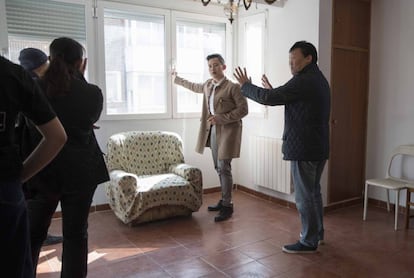Why wealthy families from Beijing are buying up apartments in Madrid
Chinese investors are purchasing properties worth at least €500,000 in a bid to earn a so-called “golden visa”


A Mercedes van with tinted windows pulls up next to a three-floor brick building in a working-class neighborhood of Madrid. A Chinese family gets out of the vehicle and looks around in surprise at their surroundings.
“Have we arrived?” asks the father.
I worked very hard at explaining that Spain was a stable country within the EU
Real estate agent Long Fang Hu
The Han family got to Madrid on Saturday morning via a flight from Beijing. They spent the first two days exploring the landmarks of the Spanish capital and on Monday began looking for an apartment to buy. If they like the look of one, they spend up to an hour going over the place, scrutinizing its every corner. If they don’t, they are out of there in less than two minutes.
They have already been to the most-exclusive areas of the city, such as El Retiro neighborhood, but this Tuesday they have decided to see apartments in the outskirts of the city. They’re willing to buy three or four properties at once, as many as are needed to cover the €500,000 required for a so-called “golden visa.” Known formally as the Law to Support Entrepreneurs and their Internationalization, this piece of Spanish legislation offers foreigners residency if they invest more than €500,000 in real estate.
A real estate agent is waiting for the Han family outside the modest building. There is no elevator and they have to walk up the stairs. The agent struggles to open the door to the apartment. When they finally get inside, it is as if they have stepped back into the 1980s. The apartment has two bedrooms, but one connected to the other, like train carriages. Once he sees this, the father, a businessman in his 50s, decides to leave. The visit has lasted less than five minutes.
Long Fang Hu, a Spaniard born to Chinese parents, has made a business out of helping Chinese investors buy real estate in Madrid. When he was 20, while other guys his age were thinking about cigarettes and nightclubs, Long already had two children and had set up the real estate agency Bafre. He first went to China as part of an exchange program with Renmin University in Beijing.
“It was good for me because I was more Spanish than Chinese, and there I became a little more Chinese,” he says from his office in Usera, the Chinatown of Madrid.
In 2018, there were 16,029 requests for a “golden visa,” of which 12,634 were granted
The neatly dressed and well-groomed 28-year-old says he started out in real estate by looking for apartments for Chinese residents who didn’t speak a word of Spanish. He was in charge of negotiating prices, translating, and asking for mortgages from the bank. He brags that none of his clients has ever defaulted on a loan.
In 2013, he spotted a business opportunity when the Popular Party (PP) government of former Prime Minister Mariano Rajoy approved the Law to Support Entrepreneurs and their Internationalization. Hu approached a Chinese contact who wanted to invest in Spain but it wasn’t until 2016, when the conditions of the law were eased, that he began seriously working with Chinese clients. Between 2016 and 2017, Hu’s business tripled its revenue from €324,000 to €1.1 million, according to the property record, and doubled the number of staff, although it still has losses of almost €100,000.
“Spain needed to be better promoted abroad. In China, you were competing with others who wanted to take these huge fortunes to London, Paris, Toronto, cities of countries that had a much better profile. I worked very hard at explaining that Spain was a stable country within the EU, with a very long history. [In China] they don’t know that it was an empire,” says Hu. His sales representatives – both Spanish and Chinese – show clients informational brochures on Spain that cover everything from the conquest of the Americas to soccer star Andrés Iniesta’s legendary goal at the 2010 World Cup in South Africa.
Most Chinese clients buy property as an investment, according to Hu. These investors rent out the apartment until it is worth more and then put it up for sale. However, if they divest the €500,000 needed for the golden visa, they lose their residency rights.
In the past six years, the number of golden visas handed out has grown non-stop. In 2018, there were 16,029 requests, of which 12,634 were granted, according to information provided by the Permanent Immigration Observatory in Spain. Many Chinese clients also buy property because they hold the Spanish education system in high esteem, says Hu. “Chinese [clients] ask for two- or three-bedroom apartments near good schools and universities. That really interests them,” he explains.
Chinese clients ask for two or three-bedroom apartments near good schools and universities
Real estate agent Long Fang Hu
That includes the Han family – a generic name given to protect the identity of the real client – who spent one morning at the Fashion and Design School (IED) because their teenage daughter is planning on studying at the institute when she finishes high school.
Potential investors prepare their trip three months ahead of time. They first receive a folder with the apartments they could buy and panoramic videos to give them a better idea of the space. “You have to get a feeling for it, it’s not just a product you touch, it’s something more,” is one of the slogans of Bafre, which has seven offices in Madrid, one in Beijing and partners in Shanghai.
The final trip usually lasts a week. There are things that the Chinese clients struggle to understand, like the reluctance to alter heritage buildings. In China, investors can own a property for 70 years, after which time it becomes property of the state again. This means the city skyline is constantly changing, with buildings being pulled down and put back up again in a heartbeat.
Chinese investors are also surprised by Spanish hospitality. The Han family were delighted when a stranger on the street offered to show them an apartment they couldn’t find. Their idea was to visit Madrid and Barcelona and then decide where to buy. But the family found a place they like in a housing development in the Pacífico neighborhood. It has two bedrooms, two bathrooms, a large balcony and is located next to the Tierno Galván park. They made the decision after seeing 11 apartments in two days.
On Wednesday, they returned to the place in Pacífico to quickly negotiate the price, but they had to do so against the clock. The flight to take them back to Beijing was waiting...
“Exhaustive controls”
José Ignacio Paniagua is a lawyer and an expert in the Law to Support Entrepreneurs and their Internationalization. He specializes in helping Chinese clients complete the process to apply for a "golden visa." According to Paniagua, the client first has to sign a service contract with his office, Legal UNO, which has offices in Barcelona, Málaga and Madrid. The next step is to go to a public notary and indicate that the lawyers have permission to complete all the necessary paperwork required to request residency. After that, the client must open a bank account in person.
"The account remains inactive until it passes exhaustive controls against money laundering," says Paniagua.
Once the property has been bought, the lawyers begin the process to request the special residency. Applicants must have health insurance, financial documents and a certificate proving no problems with the law over the past five years.
English version by Melissa Kitson.
Tu suscripción se está usando en otro dispositivo
¿Quieres añadir otro usuario a tu suscripción?
Si continúas leyendo en este dispositivo, no se podrá leer en el otro.
FlechaTu suscripción se está usando en otro dispositivo y solo puedes acceder a EL PAÍS desde un dispositivo a la vez.
Si quieres compartir tu cuenta, cambia tu suscripción a la modalidad Premium, así podrás añadir otro usuario. Cada uno accederá con su propia cuenta de email, lo que os permitirá personalizar vuestra experiencia en EL PAÍS.
¿Tienes una suscripción de empresa? Accede aquí para contratar más cuentas.
En el caso de no saber quién está usando tu cuenta, te recomendamos cambiar tu contraseña aquí.
Si decides continuar compartiendo tu cuenta, este mensaje se mostrará en tu dispositivo y en el de la otra persona que está usando tu cuenta de forma indefinida, afectando a tu experiencia de lectura. Puedes consultar aquí los términos y condiciones de la suscripción digital.








































